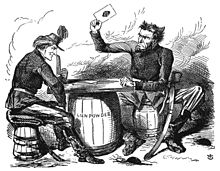
"Abe Lincoln's Last Card; Or, Rouge-et-Noir (Red and Black)"; Punch, Volume 43, October 18, 1862, p. 161.— a cartoon by the Englishman John Tenniel, after the London Times stated that Lincoln had played his "last card" in issuing the Proclamation.[87][88] Lincoln's hair is in points, suggesting horns. The cartoon was often reprinted in the Copperhead press.[89][90]
Rather than end the carnage that had already, by mid-1862, claimed the lives of thousands of Americans, Lincoln instead confiscated the property of those who sought liberty in a more perfect union, and advanced a plan to incite a race war as was done by emulating Virginia’s Royal Governor Dunmore who in November 1775 emancipated all slaves “who would repair to His Majesty’s banners.”
Lincoln’s measure freed no slaves: none under his control, and none in States where he had no control. It is important to note that Americans in the South had been freeing African slaves by deed and will since the end of the Revolution, which created a large population of freedmen. This large population would have grown without the war.
www.Circa1865.org The Great American Political Divide
Last Measure of an Exhausted Government
“While [Lincoln] thought that more evil than good would be derived from the wholesale arming of Negroes, yet he was not unwilling that that [Northern] commanders arm, purely for defensive purposes, those slaves who came within Union lines. But the President had reached a decision on the correlated policy of emancipation with which it appears that his cabinet was not in accord.
They were surprised when he read to them the first draft of a proclamation warning the rebels of the penalties provided by the Confiscation Act . . . The Cabinet was somewhat “bewildered by the magnitude and boldness of this proposal.” Only two members of the cabinet concurred in the proposal.
Secretary [Salmon P.] Chase favored this plan of military emancipation, but would not approve the method of execution. [Montgomery] Blair, the Postmaster General, deprecated this policy on the grounds that it would cost the administration the fall elections.
Secretary [of State William] Seward approved it and yet questioned the expediency of its issue at that stage of the war, owing to the depression of the public mind and the repeated reversals for the Union armies. He further deemed it to be a last measure of an exhausted government that was crying for help, stretching forth its arms to Ethiopia instead of awaiting a reverse appeal from Ethiopia. Consequently he urged a postponement of the issue . . . until the country was supported by military success.
Military reversals made the situation more serious for the President’s supporters . . . The Radicals and conservatives, resorted to incessant criticism, railing against him and his policy. Horace Greeley attacked Lincoln unmercifully in The New York Tribune and accused him of being responsible for the deplorable results coming from his failure to enforce the Confiscation Act.
Lincoln, on the contrary, lost no time in replying to Greeley, and declared that he intended to save the Union . . . “that his paramount object . . . was to preserve the Union and not either to preserve or destroy slavery; that he would save the Union, either without liberating any slaves, or by freeing all the slaves, or by freeing some and leaving others in servitude; that, at any rate, he would save the Union...”
The expected easy victory did not follow; but, on the contrary, came [the] sad and humiliating defeat of [General John] Pope [at Second Manassas] in August 1862.
On September 13, he informed a Chicago delegation that he was unable to free slaves by the Constitution, especially when the Constitution could not be enforced in the rebel States, and declared that any emancipation proclamation would at that time be as effective and operative as “the Pope’s bull against the comet.”
(Lincoln’s Emancipation Plan, Harry S. Blackiston; The Journal of Negro History, Vol. VII, No. 3, Carter G. Woodson, editor, July 1922, excerpts pp. 274-276)

No comments:
Post a Comment